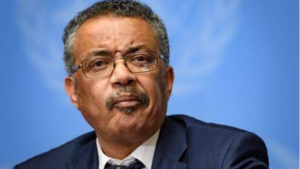 WUHAN, China (AFP) — The World Health Organization yesterday warned all governments to “take action” over the SARS-like virus spreading from China that has killed 132 people and infected around 6,000 others.
WUHAN, China (AFP) — The World Health Organization yesterday warned all governments to “take action” over the SARS-like virus spreading from China that has killed 132 people and infected around 6,000 others.
The WHO called an urgent meeting for today over whether the viral epidemic should be declared a global health emergency — a designation that can increase international coordination.
Airlines have begun suspending flights to and from China following cases of onward transmission outside the country.
And some countries have begun airlifting their nationals trapped in Wuhan, the quarantined Chinese city of 11 million people at the centre of the epidemic.
A US charter flight from Wuhan with about 210 Americans on board, including consulate staff, was met at a California military base yesterday by emergency vehicles with flashing lights and personnel in white, biological hazard suits.
The evacuees will be monitored for symptoms and sent to local hospitals if they are found to be ill, the US Defence Department said.
Among 206 Japanese nationals who returned home yesterday, 12 were hospitalised for tests after they reported they felt unwell or showed flu-like symptoms.
A growing number of governments — including the United States, Britain and Germany — have advised their citizens to avoid non-essential travel to China.
China has urged its own citizens to delay trips abroad, with at least 18 countries having confirmed cases of the disease.
In Geneva, WHO Director General Tedros Adhanom Ghebreyesus said the organisation “deeply regrets” its reports last week that referred to the global risk of the outbreak as “moderate” instead of “high”.
“I have decided to reconvene the International Health Regulations Emergency Committee on the new #coronavirus (2019-nCoV) tomorrow (today),” Tedros said on Twitter.
Michael Ryan, head of the WHO Health Emergencies Programme, told reporters that “the whole world needs to be on alert now. The whole world needs to take action”.
Ryan said declaring an international health emergency could streamline the measures taken, stressing that 194 countries implementing unilateral policies was a “potential recipe for disaster”.
Outside China, 68 further cases have been identified in more than a dozen other countries, including Germany, Japan and Vietnam where cases of human-to-human transmission have been confirmed.
British Airways was the first major airline to announce a suspension of flights to and from China, citing the travel advice of the foreign office.
It was followed by German flag carrier Lufthansa, which said all flights to mainland China would be suspended until February 9.
Indonesia’s Lion Air Group, Southeast Asia’s biggest carrier, said it would halt services to and from China from Saturday, and airlines from Myanmar and Nepal followed suit.
Hong Kong-based Cathay Pacific has reduced flights, citing low demand and the city government’s response plan to the virus.
In one of the most dramatic measures, the tiny Pacific nation of Papua New Guinea announced no travellers from Asia would be allowed in.
“Although the numbers outside China are still relatively small, they hold the potential for a much larger outbreak,” Tedros said.
“The world is pulling together to end the outbreak, building on lessons learned from past outbreaks.
“China needs the world’s solidarity and support,” he added, saying that he had held “frank talks” with President Xi Jinping.
China has taken extraordinary measures to try and stop the disease spreading, including bans on tour groups travelling overseas, suspending schools, and extending the Lunar New Year holiday.
Most street traffic in and around Wuhan has been banned, leaving more than 50 million people shuttered in their homes.
“This is the first day since the lockdown that I’ve had to go out,” a man in his 50s told AFP on the mostly deserted streets of the industrial city yesterday.
“I have no choice because I need to buy food.”
Some 250 French citizens and 100 other Europeans will be flown out of Wuhan on-board two French planes this week.
Nearly 600 European citizens in China want to be repatriated because of the coronavirus epidemic, the EU said.
France said it would keep its returnees in a holding facility in Paris for 14 days — the estimated incubation period for the virus.
Australia plans to house any citizens evacuated on an island normally used to detain asylum seekers.
The number of confirmed cases across China climbed to 5,974, while the death toll nationwide jumped to 132.
The scale of the deepening crisis was emphasised with the total number of infections on the Chinese mainland exceeding that of the severe acute respiratory syndrome (SARS) outbreak of 2002-03.
But the death toll is so far much lower than SARS, which claimed nearly 800 lives around the world — with most fatalities in mainland China and Hong Kong.
The virus is believed to have originated in a wild animal market in Wuhan, where it jumped to humans before spreading across the country as the peak travel period for new year festivities got under way.
The virus has rattled global markets and started to dent the Chinese economy.
Japanese automaker Toyota said it would keep its plants in China closed until at least February 9.
Tech giant Foxconn said yesterday that Taiwan staff at its vast network of factories in China do not need to return to work until mid-February, a move threatening supply chains for everything from iPhones to flat-screen TVs and laptops.
The virus has also disrupted sporting events, with a women’s football Olympic qualifier event moved from Wuhan to Australia.
